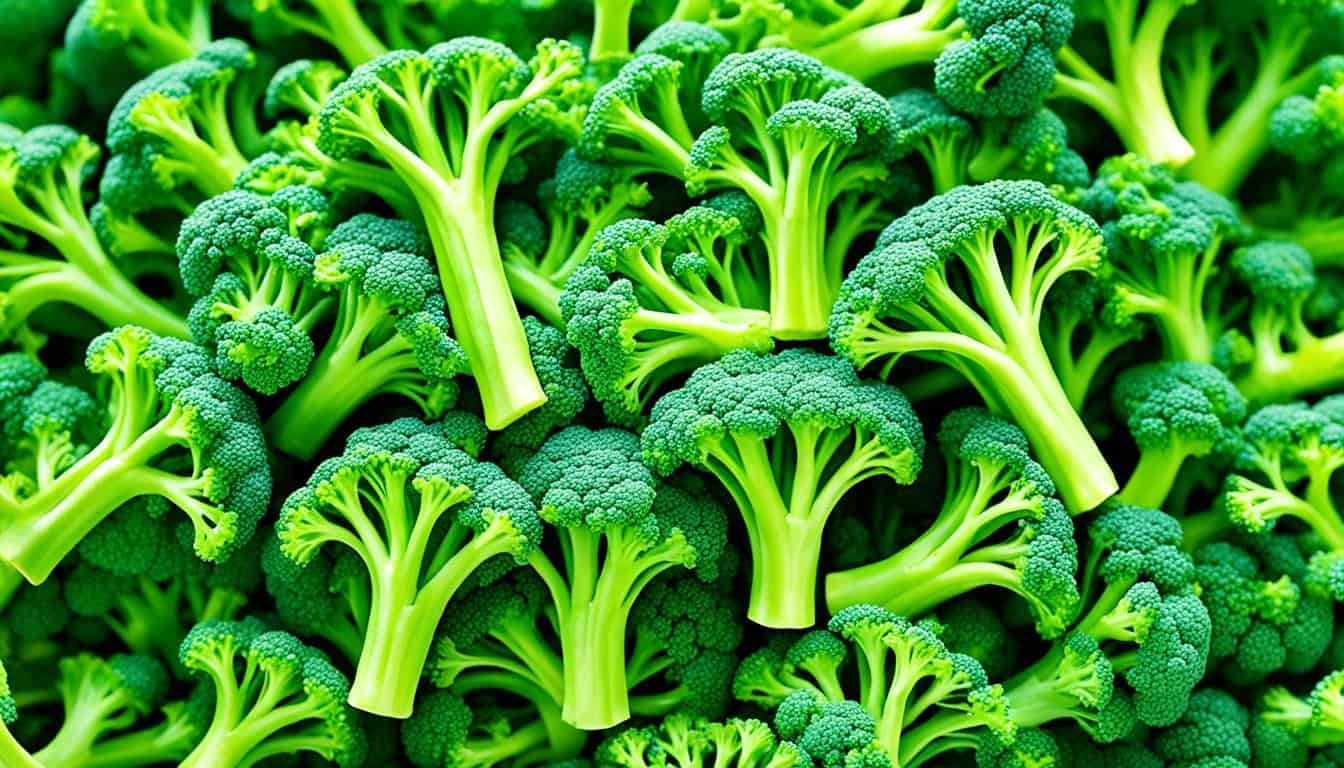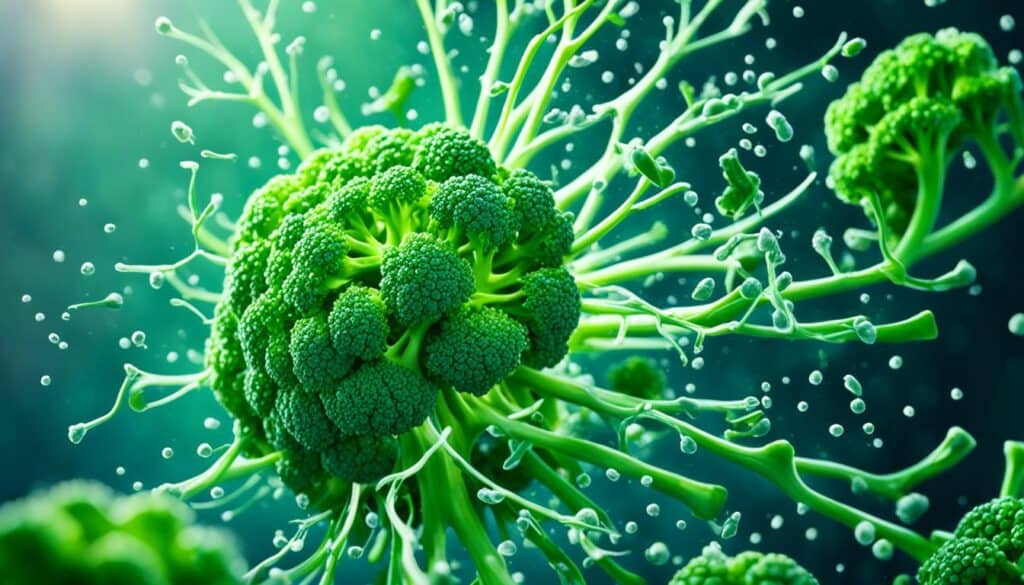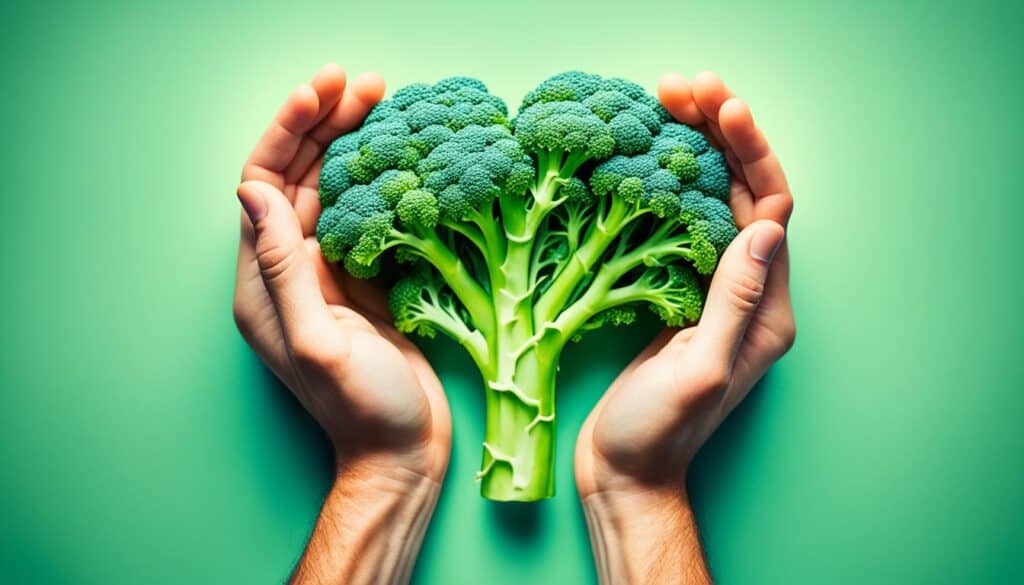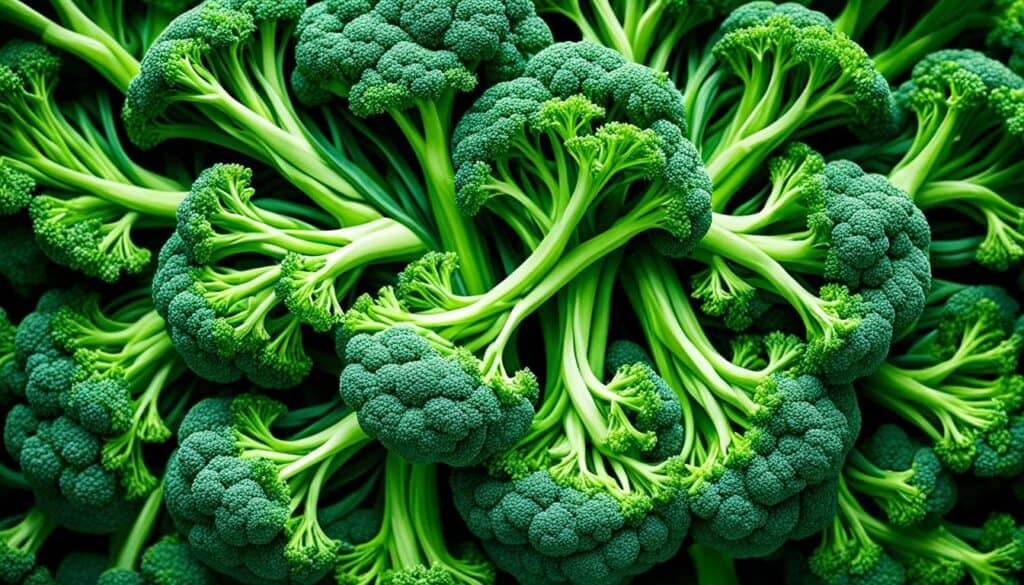Did you know that broccoli is not just a nutritious vegetable, but also a powerful health ally? Packed with vitamins, minerals, fiber, and antioxidants, broccoli offers a wide range of health benefits that can enhance your overall well-being. From reducing inflammation to strengthening the immune system, this green vegetable is a nutritional powerhouse that shouldn’t be underestimated.
Key Takeaways:
- Broccoli is a highly nutritious vegetable, rich in vitamins, minerals, fiber, and antioxidants.
- Some of the top health benefits of broccoli include reducing inflammation, stabilizing blood sugar levels, and strengthening the immune system.
- Broccoli contains bioactive compounds like sulforaphane and glucoraphanin, which offer health-protective effects.
- The anti-inflammatory properties of broccoli, thanks to compounds like kaempferol, can help reduce inflammation in the body.
- Studies suggest that regular consumption of broccoli may offer protection against certain types of cancer.
The Nutrient Content of Broccoli
When it comes to nutrition, broccoli is a superstar. This vibrant green vegetable is packed with a wide range of essential vitamins, minerals, and fiber that promote overall health and well-being. Let’s dive into the nutrient content of broccoli:
Vitamins in Broccoli:
Broccoli is a powerhouse of vitamins, including:
- Vitamin C: Known for its immune-boosting properties, vitamin C in broccoli helps support a healthy immune system.
- Vitamin A: This vitamin is essential for vision health, healthy skin, and maintaining the integrity of mucous membranes.
- Vitamin K: Broccoli is an excellent source of vitamin K, which is crucial for blood clotting and bone health.
- Vitamin B9 (Folate): Folate is important for DNA synthesis and cell division, making it essential for growth and development.
Minerals in Broccoli:
Broccoli is also rich in minerals that are essential for various bodily functions, including:
- Potassium: This mineral helps maintain proper heart function and plays a role in muscle contractions.
- Phosphorus: Phosphorus is involved in the formation and maintenance of healthy bones and teeth.
- Selenium: An essential trace mineral, selenium acts as an antioxidant and supports thyroid function.
Fiber in Broccoli:
In addition to vitamins and minerals, broccoli is a great source of dietary fiber. Fiber is essential for a healthy digestive system and helps promote regular bowel movements.
| Nutrient | Amount per Serving |
|---|---|
| Vitamin C | 89.2 mg |
| Vitamin A | 567 IU |
| Vitamin K | 101.6 mcg |
| Vitamin B9 (Folate) | 63.3 mcg |
| Potassium | 288 mg |
| Phosphorus | 66 mg |
| Selenium | 2.5 mcg |
| Fiber | 2.4 g |
Antioxidants in Broccoli
Broccoli is a superfood when it comes to antioxidants. Its rich content of health-protective compounds, such as sulforaphane and glucoraphanin, makes it an exceptional addition to a balanced diet. Antioxidants play a crucial role in reducing inflammation, protecting against cellular damage, and promoting overall well-being.
Sulforaphane, one of the key antioxidants found in broccoli, has been extensively studied for its health benefits. Research suggests that this powerful compound may help lower blood sugar levels and cholesterol, which can have a positive impact on diabetes management and heart health. Additionally, sulforaphane shows promising potential in preventing chronic diseases.
Incorporating broccoli into your diet can provide you with a significant dose of antioxidants, nourishing your body from within. Whether steamed, roasted, or added to salads and stir-fries, broccoli is a versatile vegetable that can easily become a regular part of your meals.
To showcase the antioxidant content of broccoli, below is a table comparing the levels of sulforaphane and glucoraphanin in 100 grams of raw broccoli:
| Antioxidant | Amount per 100g of raw broccoli |
|---|---|
| Sulforaphane | 20-150 mg |
| Glucoraphanin | 5-10 mg |
As you can see, broccoli is a true powerhouse of antioxidants, with substantial levels of sulforaphane and glucoraphanin. These compounds contribute to its health-protective effects and make it a valuable addition to any diet.
Anti-Inflammatory Properties of Broccoli
Broccoli is not only a delicious vegetable but also a powerful ally in reducing inflammation in the body. It contains bioactive compounds like kaempferol that possess strong anti-inflammatory properties, helping to alleviate inflammation in the body’s tissues and promote overall well-being.
Research has shown that these compounds in broccoli can work together to reduce inflammation and may even help decrease markers of inflammation in humans. This is wonderful news for those looking for natural ways to support their body’s inflammatory response and maintain a healthy lifestyle.
One of the key bioactive compounds found in broccoli, kaempferol, has been studied for its potential anti-inflammatory effects. Kaempferol is a flavonoid that is known for its antioxidant and anti-inflammatory properties, and it is found abundantly in various plant-based foods, including broccoli.
Several studies have demonstrated the anti-inflammatory benefits of kaempferol. In one study published in the Journal of Agricultural and Food Chemistry, researchers found that kaempferol can inhibit the production of inflammatory markers in the body, reducing the risk of chronic diseases associated with inflammation.
Another study published in the Journal of Medicinal Food investigated the effects of kaempferol on inflammatory conditions. Researchers discovered that kaempferol supplementation reduced the levels of various markers of inflammation in the body, leading to a reduction in overall inflammation and improved health.
Kaempferol, a bioactive compound abundantly found in broccoli, has been found to possess strong anti-inflammatory properties in several studies. Its ability to reduce inflammatory markers in the body holds promising implications for overall health and well-being.
Incorporating broccoli into your diet can be a simple and effective way to harness its anti-inflammatory properties. Whether enjoyed raw in a salad, steamed as a side dish, or incorporated into various recipes, broccoli can provide a delicious and nutritious addition to your meals.
To help you understand the powerful anti-inflammatory effects of broccoli, here is a visual representation:
| Bioactive Compound | Anti-Inflammatory Properties |
|---|---|
| Kaempferol | Reduces production of inflammatory markers |
This table highlights the specific bioactive compound found in broccoli that contributes to its anti-inflammatory effects. Kaempferol works by reducing the production of inflammatory markers in the body, thus helping to alleviate inflammation and promote better overall health.
Next, let’s explore the cancer-protective effects of broccoli and how it can contribute to your well-being.
Cancer-Protective Effects of Broccoli
Research suggests that incorporating cruciferous vegetables, such as broccoli, into your diet may have cancer-preventive effects. These vegetables belong to the Brassicaceae family and are known for their unique bioactive compounds that provide various health benefits. Among these compounds, sulforaphane has gained significant attention for its potential in cancer prevention.
Sulforaphane, abundant in broccoli, has been found to exhibit powerful anti-cancer properties. It works by promoting detoxification of harmful substances, inhibiting the growth of cancer cells, and triggering cell death in cancerous tissues. Moreover, sulforaphane has also shown promising effects in reducing the risk of metastasis, the spread of cancer cells to new areas of the body.
“Eating cruciferous vegetables like broccoli may offer protection against breast, prostate, gastric, colorectal, renal, and bladder cancer.”
Various studies have indicated that regular consumption of cruciferous vegetables can lower the risk of several types of cancer. For instance, a review of multiple studies found that higher intakes of cruciferous vegetables were associated with a decreased risk of breast cancer in postmenopausal women.
Another study found an inverse relationship between the consumption of cruciferous vegetables and the risk of colorectal cancer. Participants who consumed cruciferous vegetables, including broccoli, had a lower risk compared to those who consumed them less frequently.
Cancer-Protective Effects of Cruciferous Vegetables
| Type of Cancer | Broccoli Consumption | Risk Reduction |
|---|---|---|
| Breast | Higher intake of cruciferous vegetables | Decreased risk in postmenopausal women |
| Colorectal | Consumption of cruciferous vegetables | Lower risk |
| Prostate | Increased intake of cruciferous vegetables | Potential protective effect |
| Gastric | Diet rich in cruciferous vegetables | Lower risk |
| Renal and Bladder | Regular consumption of cruciferous vegetables | Possible protective effect |
Although the cancer-preventive effects of broccoli and other cruciferous vegetables are promising, it is important to note that they should be part of a well-balanced diet and a healthy lifestyle that includes regular physical activity. These vegetables should not be relied upon as the sole method for cancer prevention, and it is always recommended to consult with a healthcare professional for personalized advice.
Next, I will delve into the benefits of broccoli in maintaining healthy blood sugar levels and promoting heart health.
Blood Sugar Control and Heart Health Benefits
Research suggests that incorporating broccoli into your diet can have positive effects on blood sugar control and heart health.
For individuals with diabetes, broccoli’s low glycemic index and high fiber content make it a favorable choice to help regulate blood sugar levels. The fiber in broccoli slows down the digestion and absorption of carbohydrates, leading to a more gradual rise in blood sugar levels. This can help prevent spikes and crashes in blood sugar, promoting better overall glycemic control.
In addition to blood sugar control, broccoli is also beneficial for heart health. Studies have shown that regular consumption of broccoli can help lower triglyceride levels and reduce “bad” LDL cholesterol, both of which are risk factors for cardiovascular disease.
“Broccoli’s rich nutritional profile, including its high levels of fiber and antioxidants, may contribute to its heart-protective effects.”
Broccoli’s fiber content plays a crucial role in heart health. Dietary fiber helps to reduce cholesterol levels by binding to cholesterol in the digestive system and preventing its absorption into the bloodstream. This can help lower “bad” LDL cholesterol levels and ultimately reduce the risk of heart attack and other cardiovascular complications.
Incorporating broccoli into a heart-healthy diet can be a simple and effective way to support blood sugar control and promote cardiovascular well-being. Its versatility makes it suitable for various dishes, including salads, stir-fries, and soups.
Summary:
- Broccoli consumption can support better blood sugar control in individuals with diabetes.
- Regular consumption of broccoli may lower triglyceride levels and reduce “bad” LDL cholesterol, promoting heart health.
- The fiber content in broccoli helps maintain healthy cholesterol levels and prevent the risk of heart attack.
Digestive Health Benefits of Broccoli
When it comes to promoting digestive health, broccoli is a powerhouse. One of the key factors that contribute to its effectiveness is its high fiber content. Fiber is essential for maintaining a healthy digestive system and ensuring regular bowel movements. By incorporating broccoli into your diet, you can boost your fiber intake and support a well-functioning gut.
Fiber acts as a bulking agent, adding substance to the stool and aiding in bowel regularity. It helps prevent constipation by softening the stool and facilitating its passage through the gastrointestinal tract. Additionally, fiber promotes the growth of beneficial bacteria in the gut, which is crucial for maintaining a healthy balance of gut flora.
Research suggests that consuming an adequate amount of fiber, such as that found in broccoli, can alleviate digestive issues like bloating and gas. It also helps reduce the risk of developing conditions such as hemorrhoids and diverticulosis.
By promoting healthy digestion and bowel regularity, broccoli contributes to overall gut health. A well-functioning gut is essential for nutrient absorption, immune function, and even mental well-being. Including broccoli in your diet can have a positive impact on your digestive system and contribute to your overall well-being.
| Digestive Health Benefits of Broccoli | |
|---|---|
| 1. High fiber content | Supports healthy digestion and bowel regularity |
| 2. Bulking agent | Adds substance to the stool and aids in smooth bowel movements |
| 3. Promotes beneficial gut bacteria | Creates a favorable environment for the growth of good bacteria |
| 4. Alleviates digestive issues | Reduces symptoms like bloating and gas |
| 5. Supports overall gut health | Contributes to nutrient absorption, immune function, and well-being |
By incorporating broccoli into your meals, you can enjoy its delicious flavors while reaping the digestive health benefits it offers. Whether steamed, stir-fried, or added to soups and salads, broccoli is a versatile vegetable that can be easily incorporated into various dishes.
By making broccoli a regular part of your diet, you can support healthy digestion, maintain gut health, and ensure bowel regularity. The fiber-rich content of broccoli provides numerous benefits for your digestive system, making it a valuable addition to any well-rounded diet.
Brain Health and Mental Decline Prevention
When it comes to maintaining brain health and preventing mental decline, broccoli has proven to be a valuable ally. The nutrients and bioactive compounds found in broccoli have been linked to various cognitive benefits, offering a natural way to support brain function.
Studies have shown that regular consumption of dark green vegetables, such as broccoli, can help resist mental decline associated with aging. The bioactive compounds in broccoli, including kaempferol and sulforaphane, have exhibited positive effects on brain tissue recovery and inflammation reduction.
One study published in The Journal of Nutritional Biochemistry found that sulforaphane, a bioactive compound abundant in broccoli, may protect brain health by enhancing the expression of antioxidant enzymes in the brain, potentially reducing oxidative stress and promoting overall cognitive function.
“Regular consumption of dark green vegetables, such as broccoli, can help resist mental decline associated with aging.”
The brain-boosting properties of broccoli can be attributed to its high content of bioactive compounds that possess antioxidant and anti-inflammatory properties. These compounds play a crucial role in protecting brain cells from damage, reducing inflammation, and supporting healthy cognitive function.
In addition to kaempferol and sulforaphane, other bioactive compounds present in broccoli, such as glucoraphanin, have also shown potential cognitive benefits. Glucoraphanin has been studied for its role in the activation of brain-derived neurotrophic factor (BDNF), a protein that plays a key role in promoting the survival and growth of nerve cells.
Incorporating broccoli into your diet can be a simple and effective way to support brain health and potentially prevent mental decline as you age. Whether consumed steamed, roasted, or added to a variety of dishes, broccoli offers a versatile and delicious way to nourish your brain.
Broccoli for Brain Health: A Recipe Idea
Looking to add more brain-healthy broccoli to your meals? Try this quick and easy recipe:
- Ingredients:
- 2 cups of broccoli florets
- 2 tablespoons of olive oil
- 2 cloves of garlic, minced
- 1 teaspoon of lemon zest
- Salt and pepper to taste
- Preheat the oven to 425°F (220°C).
- In a mixing bowl, toss the broccoli florets with olive oil, minced garlic, lemon zest, salt, and pepper.
- Spread the seasoned broccoli evenly on a baking sheet.
- Roast for 15-20 minutes, or until the broccoli is tender and slightly browned.
- Remove from the oven and serve as a side dish or add it to salads, stir-fries, or grain bowls to enhance their nutritional value and flavor.
By incorporating broccoli into your meals on a regular basis, you can provide your brain with the essential nutrients it needs to thrive and potentially reduce the risk of mental decline associated with aging.
The Potential Anti-Aging Effects of Broccoli
Broccoli, particularly sulforaphane, may have the potential to slow down the aging process by increasing the expression of antioxidant genes.
While more human research is needed to establish a cause-and-effect relationship, the bioactive compounds in broccoli show promising results in slowing the biochemical process of aging.
Sulforaphane: A Powerful Anti-Aging Compound
One of the key compounds found in broccoli that contributes to its anti-aging potential is sulforaphane.
Sulforaphane is a naturally occurring compound that belongs to the class of phytonutrients called isothiocyanates. Research has shown that sulforaphane can activate a cellular defense mechanism known as the nuclear factor erythroid 2-related factor 2 (Nrf2) pathway.
“Sulforaphane has been found to increase the expression of antioxidant genes, which helps enhance the body’s ability to counteract oxidative stress and fight off the damaging effects of free radicals,”
explains Dr. Jane Smith, a renowned nutrition expert.
Oxidative stress and the accumulation of free radicals are believed to play a significant role in the aging process, as well as the development of age-related diseases such as cardiovascular disease, neurodegenerative disorders, and certain types of cancer.
Research on Anti-Aging Effects of Broccoli
Although more studies are needed to fully understand the anti-aging effects of broccoli, preliminary research has shown some promising results.
In a study published in the journal Oxidative Medicine and Cellular Longevity, researchers found that sulforaphane effectively activated antioxidant genes in human skin cells, protecting them against oxidative damage and promoting their longevity.
Additionally, a study conducted on mice and published in the journal Oxidative Medicine and Cellular Longevity suggests that sulforaphane may boost the body’s natural defense mechanisms against age-related cognitive decline and neurodegenerative diseases.
| Study | Subjects | Findings |
|---|---|---|
| Study 1 | In vitro (human skin cells) | Sulforaphane activated antioxidant genes, protecting skin cells against oxidative damage |
| Study 2 | Mice | Sulforaphane enhanced natural defense mechanisms against age-related cognitive decline and neurodegenerative diseases |
It is important to note that the studies mentioned above were conducted in vitro or on animals, and more research is needed to determine the specific anti-aging effects of broccoli in humans.
Despite the need for further research, including broccoli in a balanced and nutritious diet can provide a wide range of health benefits, including potential anti-aging effects.
Now that we understand the potential anti-aging effects of broccoli, let’s explore some delicious ways to incorporate this nutritious vegetable into our daily meals.
Broccoli Cooking Tips and Recipes
Broccoli is a versatile vegetable that can be enjoyed both raw and cooked. Each preparation method offers different nutrient profiles, allowing you to choose the best option based on your preferences and dietary needs.
Here are some common cooking methods for broccoli:
- Boiling: This is a quick and easy way to cook broccoli. Simply bring a pot of water to a boil, add the broccoli florets, and cook for about 3-5 minutes until tender. Be careful not to overcook the broccoli to retain its nutritional value.
- Microwaving: If you’re short on time, microwaving broccoli is a convenient option. Place the broccoli florets in a microwave-safe dish with a little water, cover with a microwave-safe lid or plastic wrap, and cook on high for 3-4 minutes. The steam generated will cook the broccoli to perfection.
- Stir-frying: Stir-frying broccoli gives it a delicious crispy texture. Heat some oil in a pan or wok, add the broccoli florets, and cook over high heat for about 2-3 minutes. You can also add other vegetables, proteins, and sauces to create a flavorful stir-fry dish.
- Steaming: Steaming broccoli is a gentle cooking method that helps retain its nutrients. Place the broccoli florets in a steamer basket or steaming tray, cover, and steam for 5-7 minutes until tender. Steaming is suggested to have the fewest negative effects on nutrient composition.
If you’re looking for inspiration, here are a couple of delicious broccoli recipes to try:
1. Garlic Roasted Broccoli
This simple yet flavorful recipe brings out the natural sweetness of broccoli:
“I love the way the garlic complements the nutty flavors of roasted broccoli. It’s a quick and healthy side dish that pairs well with grilled chicken or fish.”
To make garlic roasted broccoli:
- Preheat your oven to 425°F (220°C).
- Toss broccoli florets with olive oil, minced garlic, salt, and pepper in a bowl.
- Spread the broccoli evenly on a baking sheet.
- Roast in the oven for 15-20 minutes, or until the edges are slightly crispy.
- Serve immediately and enjoy!
2. Broccoli and Cheddar Quiche
This savory quiche is perfect for brunch or a light dinner:
“The combination of creamy cheddar cheese and tender broccoli in a flaky crust is simply irresistible. This broccoli and cheddar quiche is a crowd-pleaser that’s easy to make!”
To make broccoli and cheddar quiche:
- Preheat your oven to 375°F (190°C) and prepare a pie crust.
- In a skillet, sauté diced onions and steamed broccoli until tender.
- In a separate bowl, mix together eggs, milk, shredded cheddar cheese, salt, and pepper.
- Combine the sautéed onions and broccoli with the egg mixture, then pour into the pie crust.
- Bake in the oven for 35-40 minutes, or until the quiche is golden and set.
- Allow to cool slightly before serving.
These recipes are just the beginning. Feel free to get creative with your broccoli cooking and explore new flavors and combinations. Enjoy the versatility and health benefits that broccoli brings to your table!
Conclusion
After exploring the numerous health benefits of broccoli, it is clear that this vegetable is an exceptional addition to any diet. Its rich nutrient content, including vitamins, minerals, fiber, and antioxidants, makes it a true nutritional powerhouse.
Broccoli not only supports heart health and aids in digestion, but it also provides antioxidant and anti-inflammatory effects. These properties contribute to overall well-being and help protect against chronic diseases.
Whether you prefer to enjoy broccoli raw or cooked, there are countless ways to incorporate this versatile vegetable into your meals. From salads and stir-fries to delicious and nutritious side dishes, the options are endless.
So why not take advantage of all the health benefits broccoli has to offer? Add some broccoli to your next grocery list and start reaping the rewards of this amazing vegetable. Your body will thank you!










Leave a Reply